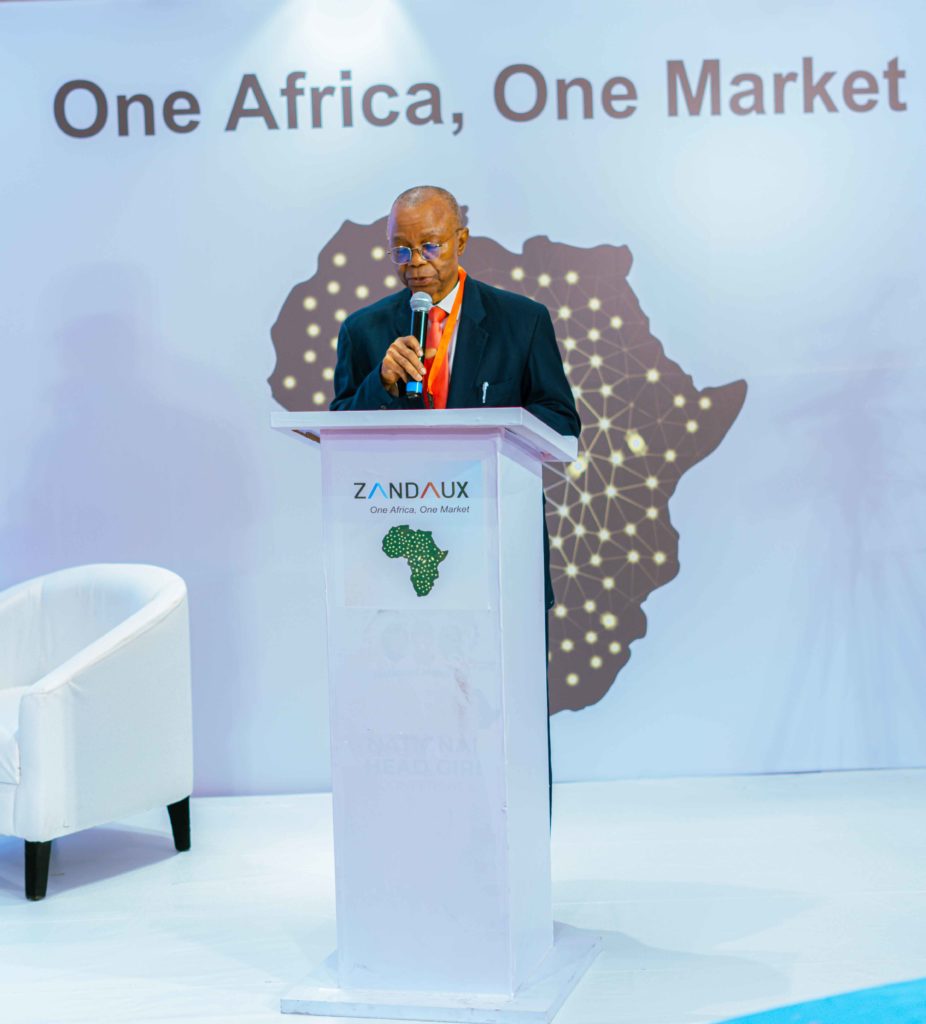
Zandaux, pronounced zan-doe is a business-to-business (B2B) e-commerce platform that connects manufacturers, distributors, and retailers. Zandaux which means marketplace in Lingala is a modern multi-vendor platform that enables retailers to buy goods directly from the factory/manufacturers. Everything on the platform is sold by verified manufacturers and authorised sellers and Zandaux eliminates all the bottlenecks and hedges in the local supply chain. By letting retailers buy directly from the factory, Zandaux bypasses unnecessary middlemen leaving only those who add value to the ecosystem.
The event saw the presence of industry policymakers, government officials, traders, manufacturers, and other retail supply chain players. The event formally began with introductory remarks from Dennis Reumer, the CTO of Zandaux, “Today we officially launch Zandaux, opening the doors for Nigeria to join the African B2B trading market. This is a small step for Zandaux but a great step for African trade,” he said. “Zandaux has a purpose, that purpose started years ago in the heart of our founder and that purpose is to help people overcome poverty. Many things contribute to the circumstances why poverty persists. An important factor is accessibility to worldwide economic markets. Many of the facilities in other economic zones are lacking in Africa, so let’s bring those facilities to Africa.”
By making domestic and cross-border trading in Africa more accessible, Zandaux has created a marketplace for big and small businesses to thrive.
In attendance at the launch was the President of Lagos State Chamber of Commerce and Industry, Gabriel Idahosa who commended Zandaux on this groundbreaking launch and its visionary leadership. “The launch of Zandaux is a significant step towards a future in which the boundaries that have historically limited African commerce are completely removed, paving the way for a vibrant and interconnected marketplace,” he said in his keynote remark touching on the future of B2B commerce in Africa.
“Africa as an economy has long been a reservoir of economic potential. The time has come for us to harness the powers of B2B e-commerce to unlock these opportunities, so we move from potential to reality,” Idahosa noted.

Idahosa also spoke on how players in the e-commerce industry need to be actively involved in policy-making concerning their industry. He concluded by calling upon all entities to collaborate to achieve a better future for B2B e-commerce in Africa.
The keynote speech was followed by a panel session on the “Current State of B2B e-commerce in Africa, opportunities, trends, and challenges”. This session was moderated by Sikelola Olaifa, the digital innovation and entrepreneurship advisor at GIZ. On the panel was Tolulope Olukokun, CEO of Thinkbikes Limited, who spoke of his positive experience trading across Africa through Zandaux and the opportunities in African markets. He also spoke about the role technology has to play in advancing Africa.

Adeshina Adewumi, the CEO of Trade Lenda echoed Olukokun’s point about technology being an enabler of the economy. He emphasised that technology is a catalyst for digital transformation which will help Africa build businesses, eradicate poverty, and meet sustainable development goals. Bunmi Kole Dawodu, the Lagos State manager of SMEDAN, spoke on collaboration and policy-making. He underscored the need for strong public-private partnerships, urging for more conversations like the Zandaux panel and imploring stakeholders to engage with policy-makers and give feedback that will assist policy-making.
Finally, Branice Mayienga, CEO of Africa Resource Connect, drew from her 25+ years of experience in the FMCG industry to speak on the evolution of the African business landscape and the lessons learned. She stated that B2B e-commerce has opened up Africans to a wider customer base and that has positively disrupted the way business is conducted and how businesses communicate with customers.
Zandaux founder’s address
The founder and CEO of Zandaux, Franck Obambi shared the vision that Zandaux has while stating that Africa’s retail sector is largely informal meaning that most retailers own small shops and stores. The retail supply chain is also fragmented and unstructured. There are multiple middlemen between the manufacturers and retailers, and this list includes distributors, sub-distributors, logistics providers, etc. With the way this system is structured, retailers sometimes buy goods 50% higher than they are sold by the manufacturers. This cost is ultimately shifted to the final consumer and this market system contributes to high living costs for Africans. If the retailer can get her goods quickly and cost-efficiently, then she can sell at a fairer price to the consumer. Seeing the potential in Africa if this problem is solved, Franck Obambi Ngatse created Zandaux as a way to re-invent intra-Africa trade.
Franck describes Zandaux as a holistic approach to poverty. “Poverty is not an exclusively African issue.” He says, “There are countries in the world that have overcome poverty. With Zandaux we have the opportunity of reducing the cost of living in Africa especially if we let our (African) businesses connect directly with suppliers across our entire markets.” he adds. How Zandaux platform can be used as a tool to help solve poverty in Africa is simple. Zandaux exists as a solution to the problems of inconsistency and inefficiency in trade in Africa. If businesses can operate more efficiently, they can not only generate wealth but also grow. Businesses bring wealth to the government and the people.
We provide African businesses with the unique opportunity to target all African markets as one. This alone represents a new source of growth for our local businesses and it can be translated into an overall economic growth with massive job creation ability.
“This is why we say we are not just trading; we are helping one billion people overcome poverty. It doesn’t matter what your products and services are in Nigeria, you now have access to the entire African market.” Franck said.
Zandaux is solving both big and small business problems; from the African in the diaspora importing local treats for other diasporans, to the decor seller in Kenya who would like to source unique items from Nigeria. Zandaux is smoothing the process of cross-border trade and streamlining the retail supply chain in Africa and by doing this, the company is transforming lives and eradicating poverty.
With Zandaux, manufacturers benefit from having direct access to retailers and other bulk buyers all over Africa. Finish the time where producers have to open several production plants in different regions or countries in Africa. The new opportunity by Zandaux makes it also possible for the African business to source inventories at Factory prices within Africa.
Zandaux also solves the problem of counterfeiting. Counterfeiting threatens consumer’s lives and siphons profit away from legitimate businesses. The direct link between factory-to-retailers that Zandaux creates eliminates this problem and additionally, all vendors on the platform are required to provide information about the origin of their listing.
Zandaux Nigeria

Already operating in the Kenya, Zandaux is ready to take on the Nigerian market. Why Nigeria now? The country has one of the biggest economies in Africa and is a prime trade region. Now after four years and multiple expansions, Zandaux is taking over the African market and digging deeper roots by launching in Nigeria. The plan is to conquer the whole of Africa and streamline the retail supply chain into one market which is Zandaux.
With Zandaux the market for businesses doesn’t stop at their country’s borders but expands to reach buyers and manufacturers across Africa.
The event ended with a raffle draw for prizes and a countdown leading to a toast to the launch of Zandaux in Nigeria.
Join Zandaux in helping create One-Africa One-Market here.














